I am delighted to share that we recently organized a successful training session on “Adoption of Circular Economy in Food Supply Chain in Food Industries.”
Event Overview
The training program, held on July 27, 2022, at The Federation of Thai Industries (FTI) building on Nang Linchi Rd., Sathon, Bangkok, was a collaborative effort by the Food Innovation, Nutrition, and Health (FINH) and Food Engineering and Bioprocess Technology (FEBT) Academic Programs of the Asian Institute of Technology (AIT). The event was co-organized with Aston University, Chulalongkorn University, University of The Thai Chamber of Commerce, Panyapiwat Institute of Management, and The Federation of Thai Industries (FTI). The training brought together about 65 participants, including professionals from food industries, academic institutions, and entrepreneurs.
Project Background
This training was part of the “Newton Fund Project: Adopting Circular Economy in Food Supply Chain Through Industry-Academia Collaboration,” financed by the Newton Fund through the National Research Council of Thailand (NRCT). The project aims to promote the importance of the bio-circular economy in the food supply chain by fostering direct coordination and interaction with industries to facilitate the adoption of circular economy practices.
Collaborative Research
The project is a collaborative research initiative among five academic institutions: Asian Institute of Technology, Aston University, Chulalongkorn University, University of the Thai Chamber of Commerce, and Panyapiwat Institute of Management. The objective is to understand agri-food producers’ and retailers’ attitudes towards emerging issues in the food supply chain, with a specific focus on circular economy methodologies as a means to address food waste management.
Acknowledgements
I extend my sincere gratitude to all participants, organizers, and partners for their enthusiasm and contributions to this important initiative. Your active participation and collaboration are crucial for advancing sustainable practices in the food industry.
This event marks a significant step towards integrating circular economy principles into the food supply chain, contributing to more sustainable and efficient food systems.


